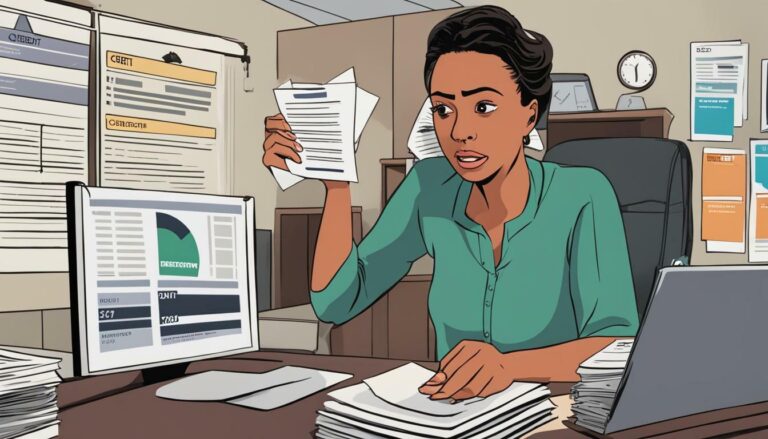Understanding How Tax Liens Affect Your Credit Scoring

Tax liens have historically been a significant factor in determining credit scores, but recent changes have altered their impact. While tax liens no longer directly affect credit scores, it’s essential to understand how they can still have negative implications for your financial life.
In 2018, the three major credit bureaus made the decision to stop listing tax liens on credit reports. This means that your credit score is no longer directly impacted by the presence of a tax lien. However, this doesn’t mean that tax liens are completely inconsequential.
Tax liens can still create obstacles in your financial journey. They can make it challenging to sell assets, as potential buyers may be wary of purchasing property with a tax lien attached. Additionally, a tax lien can affect your ability to access new credit or loans, making it harder to obtain favorable interest rates or secure financing for major purchases.
To avoid tax liens altogether, it’s crucial to pay your taxes in full and on time. This ensures that you remain in good standing with tax authorities and minimizes the risk of facing a tax lien in the first place.
If you believe there is an error on your credit report related to a tax lien, you have the right to dispute it. Contact the relevant credit bureau and provide any supporting documentation to rectify the error.
🚨 TUIC Errors + Low Credit Score?
CreditScoreIQ helps you build credit faster by reporting utility bills to all 3 bureaus—while you dispute errors.
Start Building Credit Today →Key Takeaways:
- Tax liens no longer have a direct impact on credit scores.
- Despite this change, tax liens can still affect your financial life.
- Tax liens can make it difficult to sell assets or access credit.
- To avoid tax liens, make sure to pay your taxes on time.
- If you find an error related to a tax lien on your credit report, dispute it with the credit bureau.
The Role of Tax Liens in Credit Scoring
Tax liens were previously included in credit reports and had a negative impact on credit scores. However, in 2018, major credit bureaus made changes to their reporting policies and decided to stop listing tax liens on credit reports. This shift was significant as it meant that tax liens no longer have the power to directly affect your credit score.
While tax liens no longer impact credit scores, they can still have other negative effects on your financial life. For example, having a tax lien can make it difficult to sell assets or access credit. It can also create challenges when applying for loans or mortgages. Although tax liens are not directly considered in credit scoring anymore, they can still be viewed negatively by lenders and financial institutions.
To avoid tax liens altogether, it is crucial to pay your taxes in full and on time. This ensures that you fulfill your tax obligations and avoid any potential consequences. By staying on top of your tax payments, you can prevent the need for a tax lien and protect your credit rating.
| Tip: | Pay your taxes in full and on time to avoid tax liens. |
|---|
If you believe that there is an error on your credit report, such as an incorrect tax lien listing, you have the right to dispute it. Contact the relevant credit bureau and provide any supporting documentation to support your claim. The credit bureau will investigate the dispute and make corrections if necessary.
Understanding how tax liens affect your credit scoring is essential for making informed financial decisions. While they no longer directly impact your credit score, tax liens can still have indirect consequences on your financial well-being. By staying informed, paying your taxes responsibly, and addressing any errors on your credit report, you can navigate the impact of tax liens and maintain a healthy credit profile.
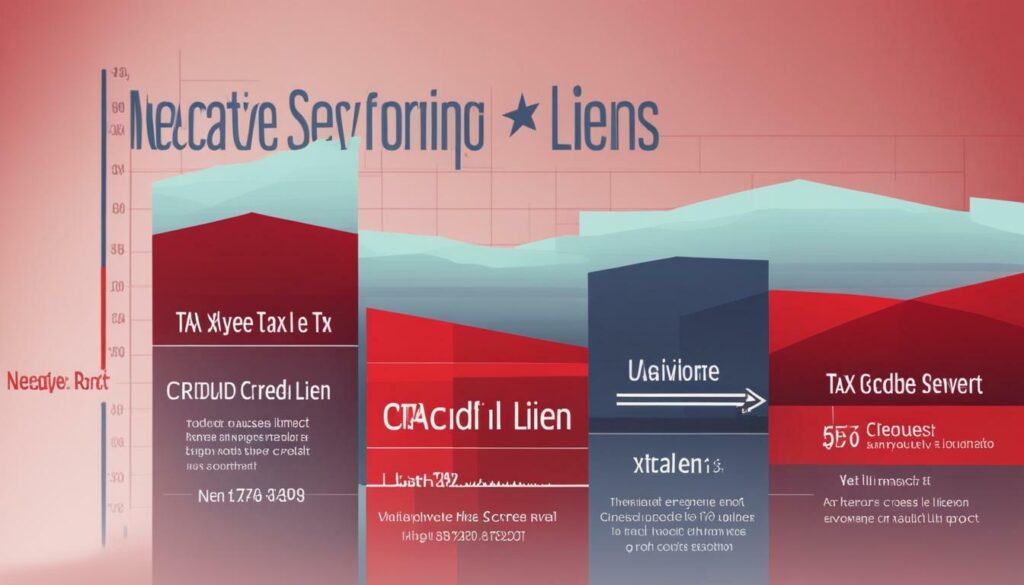
In 2018, major credit bureaus made the decision to no longer list tax liens on credit reports. This change has had a significant impact on credit ratings and scoring. While tax liens no longer directly affect your credit score, they can still have other negative implications on your financial life. Understanding how tax liens can still impact you is crucial for making informed decisions about your credit and overall financial well-being.
While tax liens may not be visible on your credit report, they can still have an indirect effect on your creditworthiness. Having a tax lien can raise red flags for lenders and make it more difficult for you to access credit or secure favorable loan terms. It can also create obstacles when you try to sell assets or make large financial transactions. Therefore, it is important to be proactive in avoiding tax liens and managing your financial obligations responsibly.
To avoid tax liens, it is essential to pay your taxes in full and on time. Ensure that you are aware of all tax deadlines and obligations, and make timely payments to the relevant tax authorities. If you believe there is an error on your credit report related to a tax lien, you have the right to dispute it with the relevant credit bureau. Provide any necessary documentation to support your claim and follow up to ensure that the error is rectified.
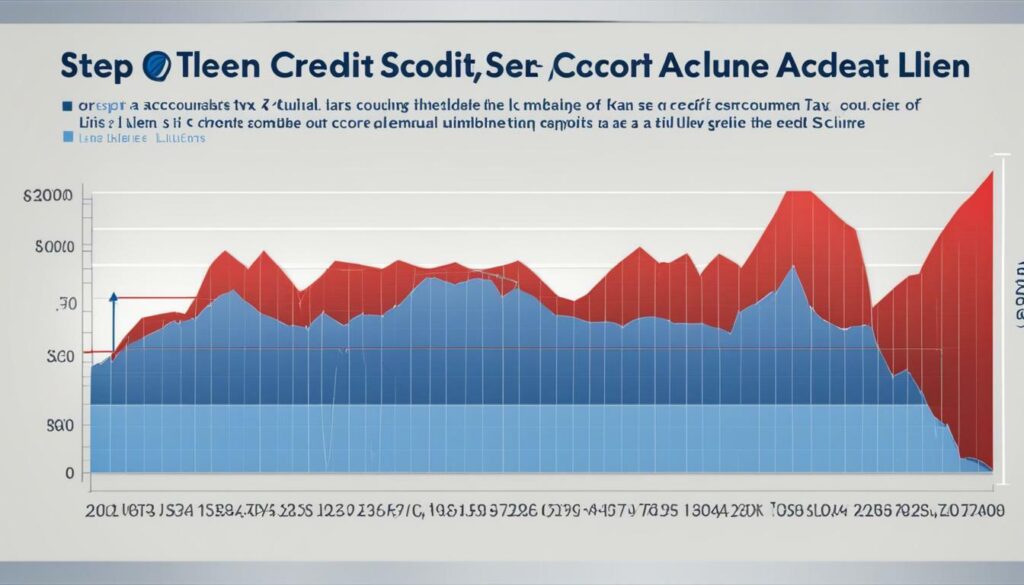
Understanding how tax liens can affect your credit scoring is key to navigating the financial landscape successfully. While they may no longer directly impact your credit score, tax liens can still have repercussions on your creditworthiness, access to credit, and overall financial health. By staying informed, paying your taxes on time, and seeking professional assistance when needed, you can mitigate the negative effects of tax liens and take control of your financial future.
Other Negative Effects of Tax Liens
While tax liens may no longer impact credit scores directly, they can still have significant negative effects on your financial well-being. These legal claims by the government can create problems in your financial life, affecting your creditworthiness and ability to make important transactions.
One major consequence of having a tax lien is the potential difficulty in selling assets. When you have a tax lien, it becomes a public record that is easily accessible to potential buyers and creditors. This can make it challenging to sell your property or other assets, as the lien can deter interested parties and complicate the sale process.
Additionally, tax liens can also hinder your ability to access credit. Lenders and creditors often view tax liens as a red flag, indicating potential financial instability or irresponsibility. This can result in higher interest rates, unfavorable loan terms, or even denials of credit applications. It’s important to note that even if a tax lien is no longer listed on your credit report, lenders may still perform additional research and discover its existence.
Furthermore, tax liens can impact your overall financial reputation and creditworthiness. Even if you have a good credit score, the presence of a tax lien can cast doubt on your ability to manage your financial obligations effectively. This can make it more challenging to secure loans, obtain favorable insurance rates, or even find employment, as some employers may conduct credit checks as part of the hiring process.
Remember, paying your taxes in full and on time is crucial to avoiding tax liens and their negative consequences. If you believe there is an error on your credit report related to a tax lien, you have the right to dispute it with the relevant credit bureau. By staying informed about tax liens and their implications, you can make informed decisions to protect your financial future.
Avoiding Tax Liens
To prevent tax liens and their repercussions, it is crucial to ensure timely and complete payment of your taxes. Failing to pay your taxes can result in the IRS placing a lien on your property or assets, which can have long-lasting negative effects on your financial life.
One effective strategy for avoiding tax liens is to stay organized and keep track of important tax deadlines. Make sure to file your tax returns and pay any owed taxes by the specified due dates. Set reminders on your calendar or use tax software to stay on top of your obligations.
Additionally, it is important to understand and comply with all tax laws and regulations. This includes accurately reporting all income, claiming eligible deductions and credits, and paying the appropriate amount of taxes based on your financial situation. If you are unsure about any aspect of your tax obligations, consider consulting a tax professional for guidance.
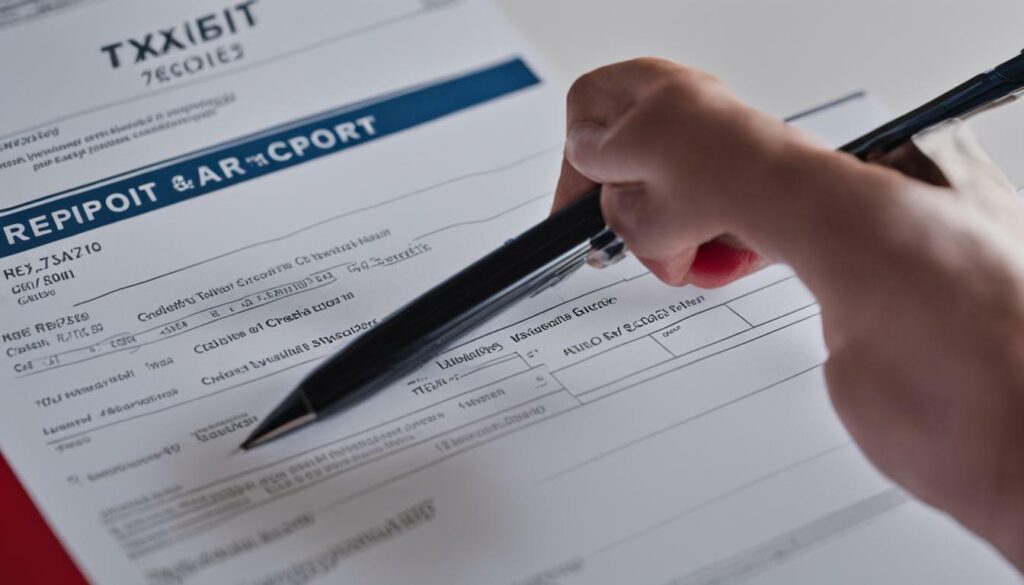
| Mistake | Explanation |
|---|---|
| Failure to file tax returns | Not filing your tax returns can attract IRS attention and increase the likelihood of a tax lien being placed on your property. |
| Underreporting income | Intentionally or unintentionally failing to report all of your income can result in penalties and potential tax liens. |
| Ignoring tax notices | Ignoring notices from the IRS or state tax authorities can lead to more serious consequences, including tax liens. |
| Incorrectly claiming deductions or credits | Claiming deductions or credits that you are not eligible for can trigger an audit and potential tax liens. |
By taking proactive measures to fulfill your tax obligations, you can avoid the negative impacts of tax liens. Remember, preventing tax liens not only protects your creditworthiness but also ensures compliance with the law and promotes a healthy financial future.
Disputing Errors on Your Credit Report
If you believe there is an error regarding a tax lien on your credit report, it is essential to address it promptly and accurately. Even though tax liens no longer directly impact your credit score, they can still have negative implications for your financial life. Disputing errors on your credit report is an important step in maintaining accurate and reliable credit information.
To begin the process of disputing an error related to a tax lien, you should start by gathering any supporting documentation that proves the inaccuracy. This may include proof of payment, release of lien, or other documents that demonstrate that the lien has been resolved or does not belong to you. Once you have gathered the necessary evidence, you can submit a dispute to the credit bureau responsible for reporting the incorrect information.
The credit bureau has the responsibility to investigate your dispute within a specific timeframe, typically 30 to 45 days. During the investigation, they will contact the relevant parties, such as the tax authorities, to verify the accuracy of the information. If the bureau determines that the tax lien is indeed inaccurate, they will update your credit report accordingly. In some cases, you may need to follow up on the progress of your dispute or provide further documentation to support your claim.
| Key Steps for Disputing Errors on Your Credit Report |
|---|
| 1. Gather supporting documentation to prove the inaccuracy. |
| 2. Submit a dispute to the credit bureau responsible for reporting the incorrect information. |
| 3. The credit bureau will investigate your dispute within a specific timeframe. |
| 4. During the investigation, the credit bureau will contact relevant parties to verify the accuracy of the information. |
| 5. If the bureau determines the tax lien is inaccurate, they will update your credit report. |
| 6. Follow up on the progress of your dispute if necessary. |

Disputing errors on your credit report is an important step to ensure the accuracy and integrity of your credit information. By addressing any inaccuracies promptly, you can protect your creditworthiness and financial reputation. Remember, understanding the impact of tax liens and other credit-related factors can help you make informed decisions and take control of your financial future.
Understanding the Impact of Tax Liens
Tax liens can have far-reaching effects on your overall creditworthiness and financial stability. While they no longer directly impact your credit score, tax liens can still have negative implications for your financial life. The decision made by major credit bureaus in 2018 to stop listing tax liens on credit reports was a significant change, but it didn’t eliminate the other consequences that can arise from having a tax lien.
One of the main concerns related to tax liens is the impact they can have on your ability to sell assets or access credit. When potential lenders or creditors see a tax lien on your record, they may view you as a higher-risk borrower and be hesitant to approve loans or extend credit. This can make it more difficult to secure financing for important purchases or investments.
In addition to credit-related challenges, tax liens can also create problems in your financial life. For example, if you have a tax lien, the government may seize your assets to satisfy the outstanding tax debt. This can include properties, vehicles, or other valuable possessions. Losing these assets can significantly disrupt your financial stability and future plans.
| Effects of Tax Liens | Solutions |
|---|---|
| Difficulty in selling assets | Pay taxes on time, negotiate with tax authorities |
| Hindrances in accessing credit | Rebuild credit, seek professional assistance |
| Potential asset seizure | Resolve tax debt, consult tax professionals |
To avoid tax liens altogether, it is crucial to prioritize the timely and full payment of your taxes. This ensures that you meet your obligations and prevent any negative consequences. If you believe there is an error on your credit report relating to a tax lien, you have the right to dispute it with the relevant credit bureau. Providing supporting documentation can strengthen your case and increase the chances of a successful resolution.

Understanding how tax liens can affect your creditworthiness and financial well-being is essential for making informed decisions. By staying informed about tax laws and fulfilling your tax obligations, you can safeguard your creditworthiness and financial stability. If you find yourself facing challenges related to tax liens, seeking professional assistance from credit counselors or tax professionals can provide valuable guidance and support in navigating these complex issues.
Mitigating the Effects of Tax Liens
Although tax liens can have adverse effects, there are steps you can take to improve your credit and financial situation. By following these strategies, you can mitigate the negative impact of tax liens and regain control of your financial future.
Rebuilding Your Credit
One of the first steps to mitigating the effects of tax liens is to focus on rebuilding your credit. Start by paying all your bills on time, as this will show creditors that you are responsible and reliable. Consider opening a secured credit card to establish a positive payment history. Additionally, you can work with a credit counseling agency to create a personalized plan for improving your credit score.
Negotiating Payment Plans
If you are unable to pay off your tax liens in full, consider negotiating a payment plan with the relevant tax authority. By setting up a structured repayment schedule, you can demonstrate your commitment to resolving your tax obligations. This proactive approach shows lenders that you are taking responsibility for your financial obligations and can help improve your creditworthiness.
Seeking Professional Assistance
If you feel overwhelmed by the process of dealing with tax liens and their impact on your credit scoring, it may be beneficial to seek professional assistance. Credit counselors or tax professionals can provide valuable guidance and help you navigate the complexities of the situation. They can also assist you in understanding the best course of action to improve your credit and financial standing.
| Benefits of Seeking Professional Assistance | How It Can Help |
|---|---|
| Expert Advice | Receive guidance from professionals who specialize in credit and taxes, enabling you to make informed decisions. |
| Customized Solutions | Obtain personalized strategies tailored to your specific financial situation, helping you address tax liens and rebuild your credit. |
| Negotiation Support | Benefit from professionals who can negotiate with tax authorities or creditors on your behalf, allowing you to reach favorable agreements. |
By taking proactive steps, such as rebuilding your credit, negotiating payment plans, and seeking professional assistance, you can mitigate the negative effects of tax liens on your credit scoring. Remember to stay informed about tax laws and regulations, as well as any changes that may affect your financial situation. With patience and perseverance, you can improve your creditworthiness and attain a brighter financial future.

If you are struggling with the impact of tax liens on your credit, seeking the guidance of professionals can be beneficial. Tax liens no longer have a direct effect on credit scores, but they can still have other negative consequences. Consulting credit counselors or tax professionals can help you navigate the complexities of tax liens and credit scoring.
These professionals have the knowledge and experience to provide you with personalized advice and guidance tailored to your specific situation. They can help you understand the broader implications of tax liens on your financial life beyond just credit scores. By working with professionals, you can develop a strategy to mitigate the negative effects and regain control of your financial future.
Additionally, credit counselors and tax professionals can assist you in disputing any errors related to tax liens on your credit report. They can help you gather the necessary documentation and guide you through the dispute process, increasing your chances of a successful resolution.
Remember, seeking professional assistance is a proactive step towards resolving the impact of tax liens on your credit. By partnering with experts in the field, you can make informed decisions and take the necessary actions to improve your financial well-being. Take advantage of their knowledge and expertise to overcome the challenges associated with tax liens.
Take Control of Your Financial Future
“Seeking professional assistance can help you navigate the complexities of tax liens and credit scoring.”
An image related to seeking professional assistance to resolve tax liens on credit scoring.
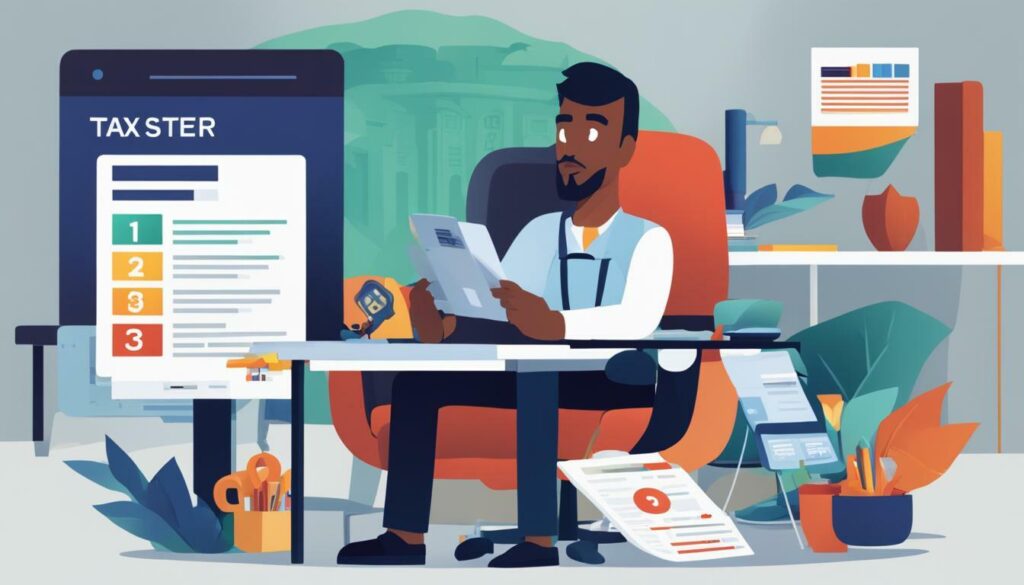
When you seek professional assistance for tax liens and credit scoring, you gain access to valuable resources and expertise. Credit counselors and tax professionals can provide personalized advice based on your unique circumstances and financial goals. They can help you understand the impact of tax liens beyond just credit scores, offering guidance on how to rebuild your credit and regain control of your financial future.
| Benefits of Seeking Professional Assistance |
|---|
| Personalized guidance tailored to your specific situation |
| Expert knowledge and experience in dealing with tax liens and credit scoring |
| Assistance in disputing errors on your credit report |
| Strategies to mitigate the negative effects of tax liens |
| Support in regaining control of your financial future |
By seeking professional assistance, you can take proactive steps towards resolving the impact of tax liens on your credit. Remember, you don’t have to face this challenge alone. Reach out to credit counselors or tax professionals today and start taking control of your financial well-being.
Staying Informed and Making Informed Decisions
Understanding the impact of tax liens on credit scoring can empower you to make informed financial decisions and secure a better future. While tax liens no longer directly affect your credit score, they can still have other negative consequences that you should be aware of.
One of the most important steps you can take to avoid tax liens is to pay your taxes on time and in full. By staying up to date with your tax obligations, you can prevent the accumulation of tax debt that may lead to liens. Additionally, regularly monitoring your credit reports can help you identify any errors or discrepancies that could negatively impact your credit scoring.
If you believe there is an error related to tax liens on your credit report, it is crucial to take action. You can dispute the error with the credit bureau responsible for the report by providing supporting documentation. This allows you to correct any inaccuracies and prevent unwarranted damage to your credit scoring.
Table: Potential Consequences of Tax Liens
| Consequence | Description |
|---|---|
| Difficulty Selling Assets | Tax liens can create obstacles when attempting to sell property or other assets, potentially affecting your financial liquidity. |
| Restricted Access to Credit | Having a tax lien on your record may limit your ability to access credit, making it more challenging to secure loans or financing. |
By understanding the impact of tax liens on various aspects of your financial life, you can make informed decisions to protect your creditworthiness. While tax liens no longer directly impact credit scoring, they can still have far-reaching effects on your financial well-being. Taking proactive steps to avoid tax liens and promptly address any errors can help you maintain a solid credit profile and ensure a brighter financial future.

Conclusion
By understanding how tax liens can impact credit scoring and taking proactive measures, you can regain control of your financial situation and shape a more secure future.
While tax liens no longer have the power to directly affect your credit score, it’s important to note that they can still have other negative effects on your financial life. These can include difficulties in selling assets and accessing credit. Therefore, it is crucial to pay your taxes in full and on time to avoid the potential consequences of tax liens.
If you come across any errors related to tax liens on your credit report, you have the right to dispute them. Reach out to the relevant credit bureau and provide supporting documentation to rectify any inaccuracies and ensure your credit report reflects your true financial standing.
Understanding the impact of tax liens beyond credit scoring is equally important. While they may not directly affect your credit score, tax liens can still impact your creditworthiness and overall financial health. Stay informed and make informed decisions to mitigate the negative effects of tax liens and safeguard your financial future.
FAQ
How do tax liens affect credit scoring?
Tax liens no longer have a direct impact on your credit score. However, they can still create problems in your financial life and affect your ability to sell assets or access credit.
Why don’t tax liens affect credit scores anymore?
The three major credit bureaus stopped listing tax liens on credit reports in 2018, which resulted in their exclusion from credit scoring calculations.
Can tax liens still have negative effects?
Yes, tax liens can still have other negative effects aside from credit scores. They can complicate your financial situation and hinder your access to credit or ability to sell assets.
How can I avoid tax liens?
To avoid tax liens, it is important to pay your taxes in full and on time. Timely tax payments can prevent the accumulation of tax debt and potential liens on your assets.
What should I do if I believe there is an error on my credit report?
If you suspect an error on your credit report related to tax liens, you can dispute it with the relevant credit bureau. Provide supporting documentation to support your claim and rectify any inaccuracies.
What is the broader impact of tax liens?
Beyond credit scores, tax liens can have wider financial implications. They can affect your overall creditworthiness, making it more challenging to obtain credit or secure favorable terms.
How can I mitigate the effects of tax liens?
To mitigate the negative effects of tax liens, you can focus on rebuilding your credit. This includes paying off outstanding debts, establishing positive credit history, and managing your finances responsibly.
Should I seek professional assistance to navigate the impact of tax liens?
Consulting credit counselors or tax professionals can be beneficial when dealing with the impact of tax liens on credit scoring. They can provide guidance and help you develop a plan to regain control of your financial future.
Why is it important to stay informed about tax liens?
Staying informed about tax liens and their effects on credit scoring is crucial for making informed financial decisions. By understanding the implications, you can better manage your finances and avoid potential setbacks.
What should I remember about tax liens and credit scoring?
Remember to pay your taxes on time to avoid tax liens. Monitor your credit reports regularly for any errors or inaccuracies related to tax liens. Seek professional assistance when needed and make informed decisions to shape your financial future.
Ready to Improve Your Credit?
Disputing TUIC errors is step one. Step two? Boost your score by reporting utility payments with CreditScoreIQ.
Get Started Now (Only $1 Trial) →3-bureau reporting • $1M identity insurance • Dark web monitoring

